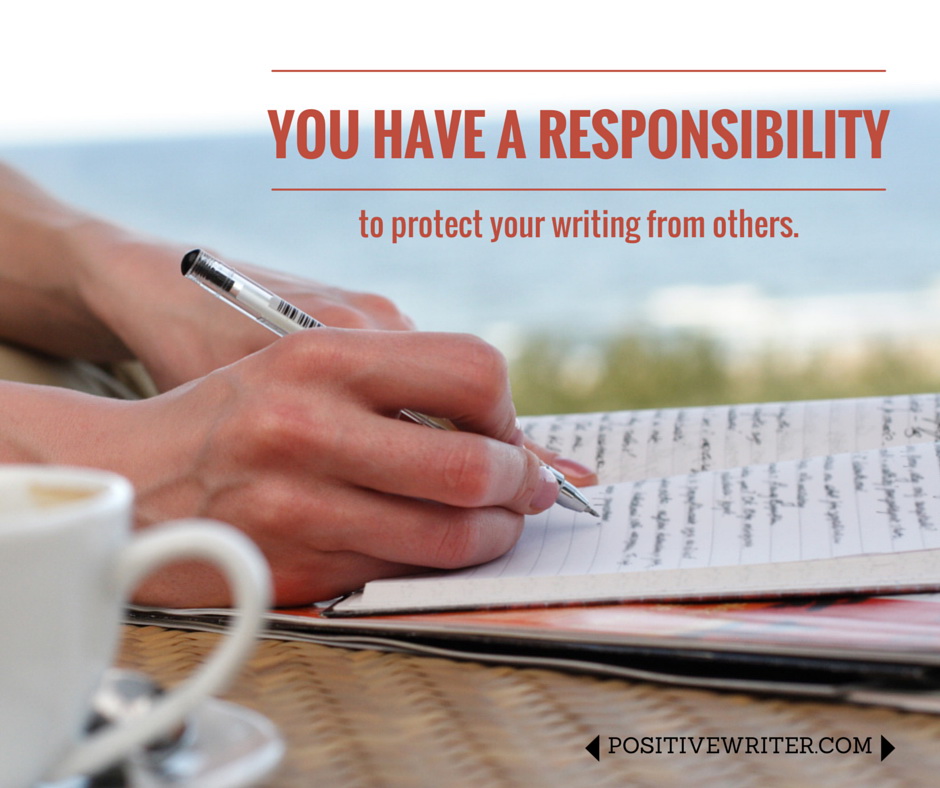As a writer, you have a responsibility to protect your writing from others…

There must be something in the air. A writer from my blog recently emailed me about an idea for a novel. It’s brilliant, very high concept, and I told him so.
He was quite encouraged. Two days later, he emailed me disappointed. He’d mentioned my response in passing to his wife, who does not care for fiction or stories. Although she didn’t intend to be unkind, her lack of enthusiasm hurt. He hadn’t written one word, but was ready to quit.
I’m happy to report he spoke to his wife and she’s now on board with his book. I hope he does it.
That same day, another writer told me about a situation where he was telling his friends about his novel. They thought of a really interesting conflict to add, but he was getting bogged down trying to incorporate the new material.
His writing had gone well beforehand. I didn’t know the whole situation, but asked if their suggestions rang true for him. I wondered if this other idea (no matter how compelling) truly fit with his original vision for this story.
He said, no. He already had a similar conflict and was scrapping the other idea to get back to his initial premise.
We MUST Protect Our Writing From Others! (Click to Tweet)
Even well meaning people can inadvertently sabotage your work. Especially, family and friends because their opinions matter most to us.
In the beginning, stories are like ugly babies. They are far from pretty and need the chance to grow up into the stories they’re meant to be. Novels, poems, short stories, nonfiction books and blogs. The possibilities are endless, if you keep your work safe from harm. Look at Writer #2’s friends, they weren’t criticizing him at all. They were excited and wanted to help, but did the exact opposite.
Other writers can wreak havoc on you, too. I have a traditionally-published friend. Her former critique group hammered her week after week about her novel. They said her prose was too flowery, too cumbersome and not commercial enough. It would never sell.
Guess what? She left that group and sold her series for six-figures. It recently hit the New York Times Bestseller List. (The author is A.G. Howard and it’s the Splintered series.)
Those naysayers haven’t come close to achieving such success. Most are still unpublished or have quit writing altogether.
This advice applies to professionals in the publishing industry, too. Just because an agent says, “Make these changes and maybe I’ll represent you.”
Unless those changes ring true for you, do not do it.
More than likely those very adjustments will ruin what makes your story unique and probably won’t change their minds either.
Learn to trust your instincts. Have the audacity to trust yourself as a writer.
Follow King’s Advice for Protection
In Stephen King’s memoir, On Writing, he passes on the advice given to him years ago by his newspaper boss, editor John Gould:
Write with the door closed. Rewrite with the door open. (Click to Tweet)
King further explains, “Your stuff starts out being just for you, in other words, but then it goes out. Once you know what the story is and get it right — as right as you can, anyway — it belongs to anyone who wants to read it. Or criticize it.”
He says it takes him about three months to write the first drafts of his novels. This feels right to him because it’s about the length of a full season of that year.
I really like that comparison — time for your story to grow into something more. You don’t understand your book until the first draft is complete and even then, you may still have more questions than answers.
It’s a p-r-o-c-e-s-s. A delicious, messy process. Some authors say it takes about five drafts to write a book. It might take you more or less.
Zip Your Lip (for Your Story’s Sake)
People you know may ask the inevitable question, “How’s the book coming along?”
They may have genuine interest, or they might be snarky (you know, your silly hobby).
Smile and say, “I’m making progress. Thanks.”
Don’t say anymore. Let it go. If they press you for details, then add, “I’m superstitious. I won’t discuss my story until it’s ready for other eyes.”
If they still can’t take the hint and ask how long that will be, say, “Probably after about five drafts, then change the subject.” Then, get away from them ASAP, whether they are friends or foes.
I can’t tell you how many writers (myself included) who regret saying anything about their projects to others: the title, the concept, what inspired you to write it. Anything.
Writing is challenging enough. Don’t make it worse by letting others destroy your work before it’s ready for its debut.
Has your writing ever been sabotaged by others (friend or foe)? If yes, how so? Share in the comments.
This post is by Positive Writer contributor, Marcy McKay. Let her know what you thought of it in the comments.
